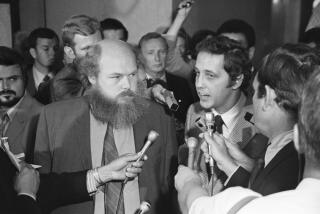Accused Wife-Killer Doesn’t Recognize His Public Image
- Share via
“Sometimes I wonder if people recognize me,” Richard Overton says.
Tall and lean, with a white mustache and beard that thickens noticeably at his chin and with wispy white tufts of hair atop his head, the 65-year-old Overton has a distinctive air about him. Blend in the soft drawl of his native West Texas and the economy and precision of his speech, and you have an even more distinctive package.
If someone told you he wrote children’s books, for example, you’d say, Yeah, he looks like the type.
The district attorney of Orange County, however, has a wholly different view of Overton, which is the reason Overton worries aloud whether people recognize him.
The D.A. thinks Overton, computer whiz and former college lecturer, almost got away with the perfect crime, poisoning his wife over time until she died in 1988. One prosecutor has called him “sadistic.” Another has said the murder “took hatred to commit and the evidence will show that this defendant had plenty of it to go around.”
Perhaps sometime later this year, another jury may get a chance to decide whether Overton is a diabolical killer or merely a bystander caught up in some of the oddest circumstances ever to surround a murder case in Orange County.
One trial has begun, only to have a state appeals court take the unusual step of declaring a mistrial. No new trial date has been set as all parties wait to resolve the question of whether the trial judge should be removed. That hearing comes up later this month.
In the meantime, waiting between trials and free on bail, Overton says he is reflecting.
“Much of the time I laugh about it,” he says as we chat over coffee at a Carl’s Jr. restaurant in Lake Forest. “I saw (myself on) ‘Hard Copy’ and much of the time they were talking about someone else (other than me). They were talking about an imaginary beast.”
Authorities weren’t suspicious when, at 46, Jan Overton collapsed and died in January of 1988. She had had a lingering series of ailments but no specific cause of death was listed when she died. Not until another of Overton’s former wives came forward months later to allege that he had once spiked her coffee with drugs did authorities begin building a case.
Late in 1991, a grand jury returned an indictment. In June of 1992, Overton’s trial began, but since then the case has featured more twists and turns than an Olympics giant slalom course.
Through it all, Overton has maintained his innocence, even questioning the much-belated but now-official coroner’s report that Jan Overton died of cyanide poisoning.
Now married to his fourth wife, with whom he has a “standing date to play Scrabble every evening,” Overton is aware that some see him as the equivalent of an evil genius.
“To say it (the image) amuses me is not right,” he says. “I would prefer that people not believe in this mythical beast. But if they do, I know it’s not true.”
Thirty years ago as a young computer programmer, Overton made TV appearances relating to his work with an “artificial intelligence” project he supervised for an aerospace company. “I was on TV quite a bit between ’63 and ‘65,” he says. “I was a featured guest on ‘Science In Action’ and that sort of thing. It was good for my ego. . . .”
But subsequent bad health and a religious awakening six months after Jan Overton’s death have helped reshape his thinking.
“What the world thinks of you, in my mind, is not important. It was not important that, if I had died in 1963, some people might have remembered me as a good celebrity. It’s your family and friends and, if you’ll pardon my saying so, your relationship with God, that really counts. Now the publicity is bad, but it’s not your public image that counts, it’s what your real person is, your relationship with others.”
Today, Overton still does computer consultation, spending part of his time preparing a database for the trial. “I have told my friends at church that if there’s anything they should pray for, it is that the truth be known. With the passage of time, a little more of the truth has come out.”
He is hoping the district attorney will drop the case but isn’t counting on it.
“I do not relish going back and being the center of attention. I would like the truth to come out, but without my participation. I don’t want to be the mouthpiece. I don’t want to be in the middle of the circus.”
I asked him why he was even willing to draw attention to the subject. “I suppose, emotionally, I’ve been demonized. I guess I would like a little injection of realism into the picture.”
Many aspects of the case have verged on the unreal, which has only added to its celebrity status. Overton’s demeanor as the imperious, eclectic murder suspect has only heightened the drama.
“Computer people are very poor at expressing their emotions, their feelings,” he says. “I know I certainly am. I read all this garbage and think, ‘Who’s that?’ They’re pretending to talk about me. I often feel, is this real? Can this really be happening to me?”
Dana Parsons’ column appears Wednesday, Friday and Sunday.
More to Read
Sign up for Essential California
The most important California stories and recommendations in your inbox every morning.
You may occasionally receive promotional content from the Los Angeles Times.













